Let's get down to business
From most angles, Mulan is an absolute triumph. Start with the narrative and writing: The story is serious and satisfying, one of the best of the Disney Renaissnace — one of their best ever, frankly. At a minimum, it’s one of the darkest Disney movies; what others include an implied genocide, complete with child murder? Its themes of defying cultural expectations are well-developed. The brand of feminism it embraces is more nuanced and less anachronistic than your typical girl-power vibe.
Mulan is also one of the best protagonists of the era: Ariel is the only other lead from the era I can think of who is clearly the most interesting character in their story. The Disney Renaissance nailed so much of its storytelling but often left its heroes as fairly generic ciphers. Mulan, though, responds to her circumstances with agency and character growth in a way that Aladdin, Simba, and even Belle never do.
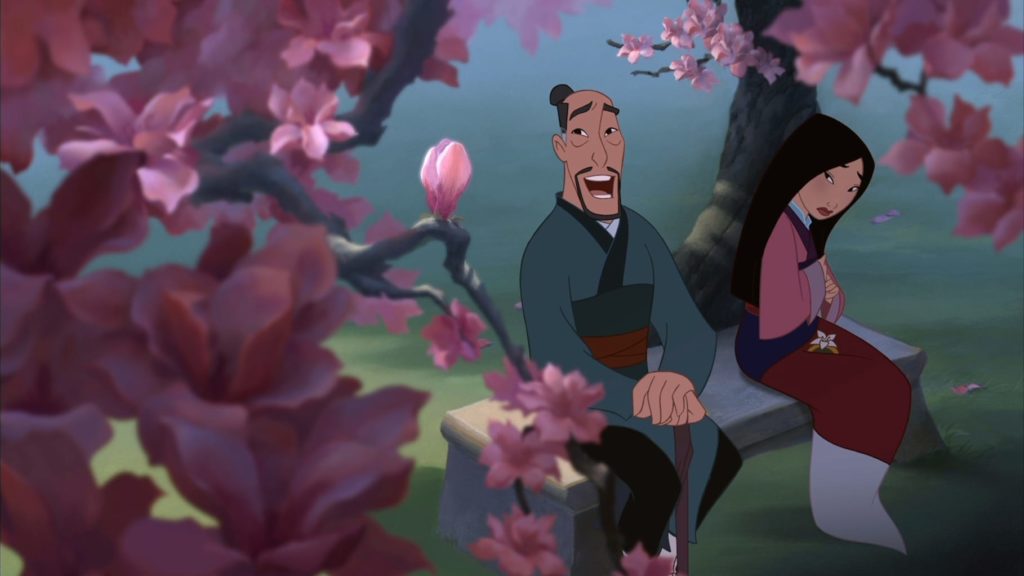
The animation is right up there with Disney’s best of the era, too. I’m especially struck by the color scheme, which evolves both subtly and strikingly as the movie’s tone shifts. The red-white-gray palate of the discovery of the burnt village and defeated army is an especially haunting look, totally different than the pastel-heavy opening and brightly-colored finale. The pair of montages in the first half of the film — Mulan stealing her father’s armor, and later the “I’ll Make a Man Out of You” training sequence — have some balletic, music video-style grace to them.
There are some absolutely terrific shot designs and clever uses of perspective throughout the film. I’ve always been struck, for example, by the moment when Shan Yu’s hand rises from the snow; it subverts the composition’s deep focus with a minor jump scare in the foreground. The whole mountain battle and its aftermath are sublime filmmaking in general. The Hun army is imposing and daunting, and the white snow provides a stark background. And when it shifts to an avalanche rescue scene, the disaster effects are just as threatening.
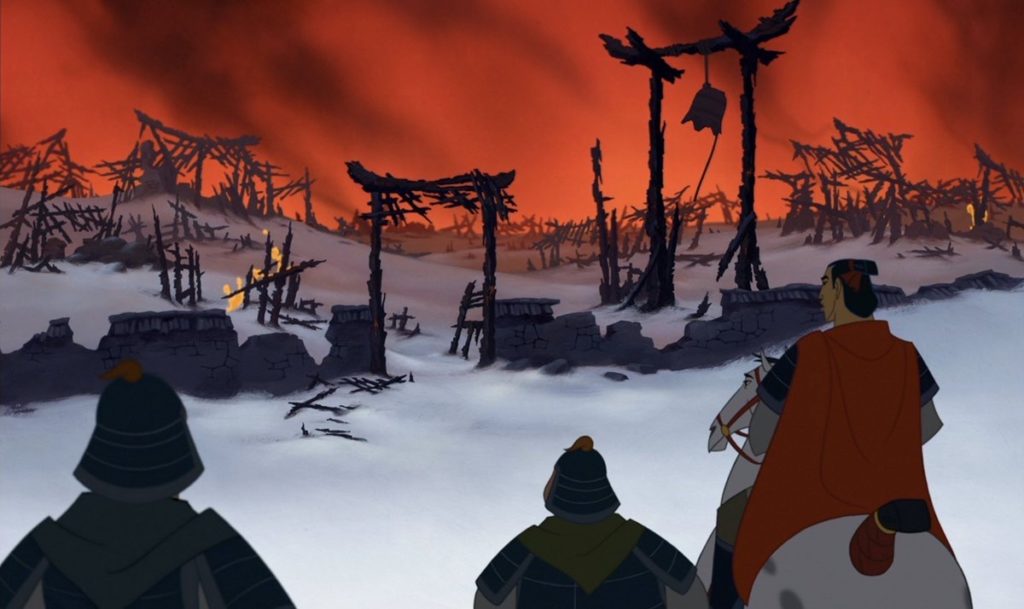
And the soundtrack is great, too. Matthew Wilder, in his only outing as the musical composer for Disney’s movies, provides some outstanding numbers: “Reflection” is a pantheon number, a perfect soaring “I Want” song, even in its truncated form (having Lea Salonga on vocals brings any song to its peak potential). “I’ll Make a Man Out of You” is the terrific training tune, filled anthemic strings and voiced by former teen idol Donny Osmond. All of the numbers are good, and the score, by Jerry Goldsmith (known in a movie group I’m part of as “your favorite composer’s favorite composer”), is quite rich, too.
Alas, Mulan is held back by a few problems. I find the third act, everything after the discovery of Mulan’s identity, to be a major step down from the first two thirds of the film. All of the characters’ motivations are a bit unclear and require some rationalizing — Why does Mulan not just go home? Why does no one listen when she says the Huns are in the city? Why does the concubine trick work on the Hun guards? (The latter, in particular, is so clearly designed to give us a mirror situation of forcing the men to dress up as women.)
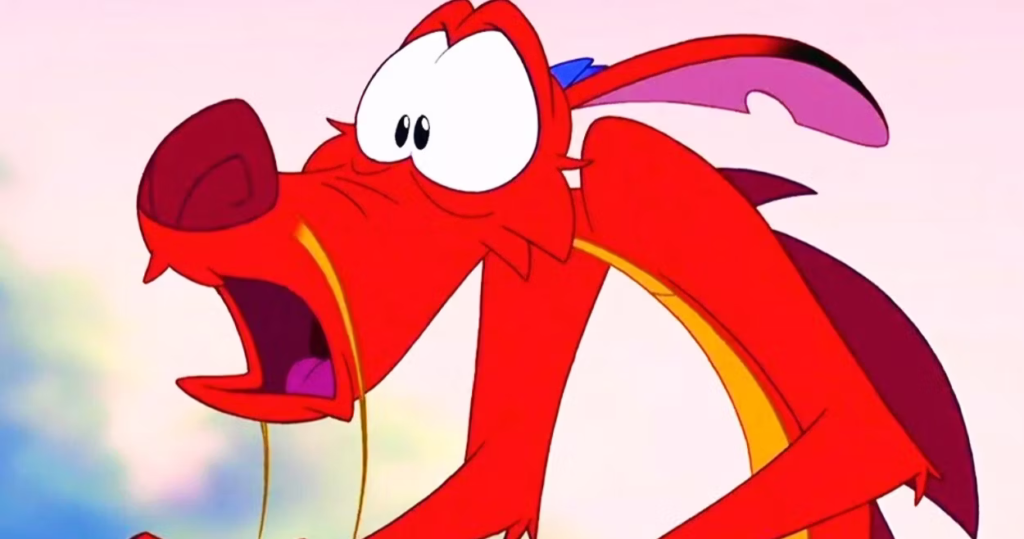
And then there’s Mushu. The first of Eddie Murphy’s animated quipping sidekicks. He really is a source of incredible tonal whiplash. The rest of the movie is serious, but not without comedy: There’s some terrific slapstick in the matchmaker scene, for example, and some of Mulan’s identity-hiding high-jinks. But when Mushu’s on screen, it’s a totally different kind of comedy that’s all jarring one-liners.
But I don’t entirely hate him. For starters, he’s actually pretty funny. Some of his lines are hilarious, and Murphy has some fantastic deliveries. (There are plenty of groaners, too, to be fair.) But he’s overall a small enough figure and has enough of a character arc paralleling Mulan’s quest that he flows better with the film than, e.g., the gargoyles in Hunchback of Notre Dame.
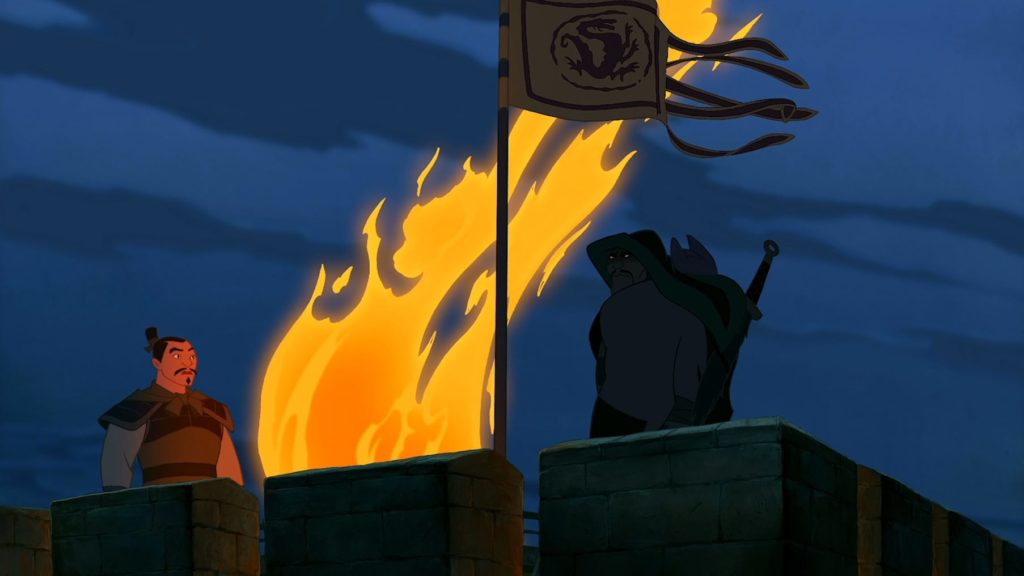
Ultimately, Mulan remains one of the crown gems of Disney’s renaissance, and a borderline top-10 Walt Disney Animation Studio picture to date. It’s one of the Disney canon’s most sophisticated pieces of both animation and mature storytelling. Even with its hiccups, it’s a tremendously satisfying film.
Is It Good?
Exceptionally Good (7/8)
Dan is the founder and head critic of The Goods. Follow Dan on Letterboxd. Join the Discord for updates and discussion.

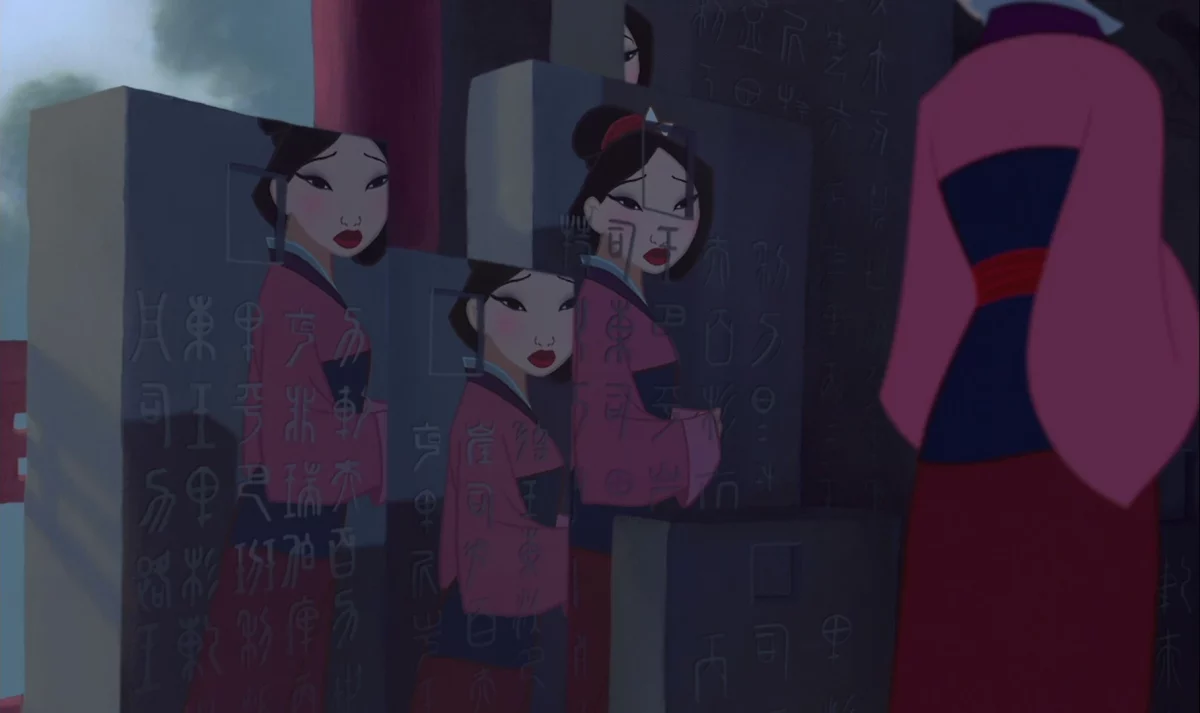
2 replies on “Mulan (1998)”
Cosigned on it being pretty much all great until the third act. The sheer cartoonishness of the drag subterfuge is already its own problem–I mean, Ping is a plausible dude, but leaving aside “passing femininity” entirely, the character designs for the side characters have locked them into some pretty implausible brides for a freaking emperor, and it’s so purely just a jape, in a film that hasn’t been about japes for three-quarters of an hour if it was ever about them in the first place–but I’ll go you one better, and just ask, “what does the Hunnic leader believe he’ll accomplish with this?” Does he think they’re gonna just… make him emperor of the Northern Wei, or whatever this dynasty is?
Admittedly, it’s not altogether their fault, the Ballad of Mulan doesn’t have much of a finale. But they wanted to narrow it down to a personal confrontation with second act “all is lost and our heroine is defeated and humiliated” atmosphere and, having previously needed to have her win the actual decisive battle against the Huns, it kind of feels like they sort of just jammed whatever was necessary into the film to get there.
Agreed. Especially on the last point — it’s a redux of Mulan vs. Shan Yu for the sake of it.
My take on the Huns’ motivation towards the end is a bit of a projection/imagintion (this third act requires a lot of that). But I always took it to be the death rattle revenge assassination; the real loss of the invasion happens in the battle, this is just Shan Yu’s attempt to deliver some pain with what he has left.